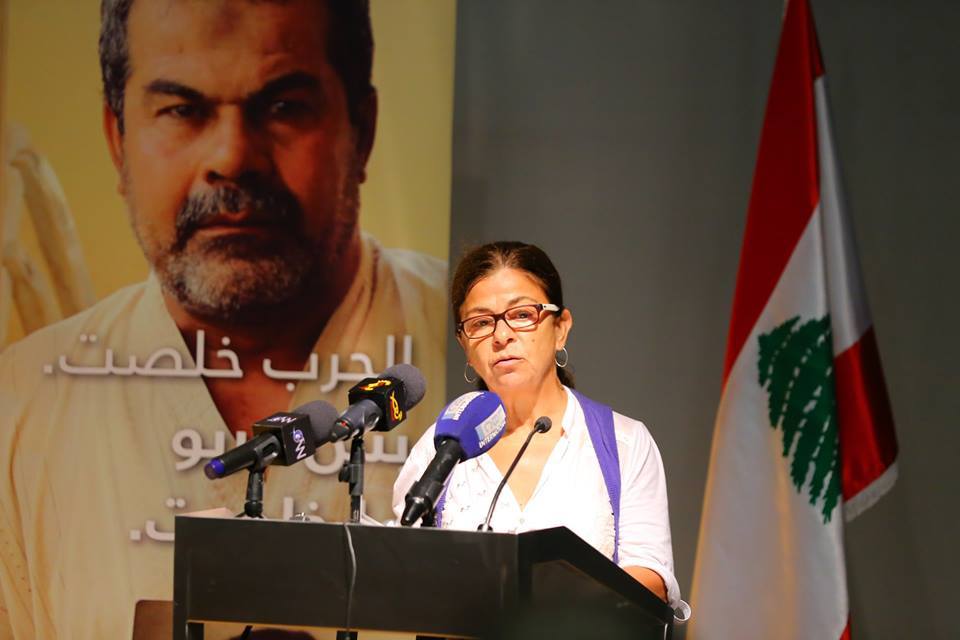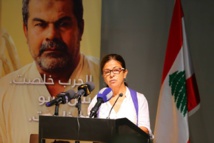Two guns were pointed at Adnan's head. The unknown men said they were from the "state" and would ask him a few questions
It was lunch time on the day when Wadad Halwani’s life changed for good. Wadad was at the kitchen on 24 September, 1982, when she heard her beloved husband Adnan saying to two men: "Let me inform my wife first”. She thought some acquaintances came for a sudden visit and he invited them to share their meal. What she saw never left her memory. She tells the story as if it had just happened, with full details and vivid description. Two guns were pointed at Adnan's head. The unknown men said they were from the "state" and would ask him few questions about some car accident; and that he would be back in "five minutes". Her husband tried to console her by stressing he was taken by the"state" and not militias in war-torn Beirut, still under Israeli occupation. Those "minutes" never ended and Adnan, then 36 years old, didn't come back.
Wadad blamed herself thinking she could have saved him by screaming, so neighbours would have come for help. However, after long tiring years, she is sure there was nothing she or anyone else could have done to resist the abduction.
Who wanted to silence Adnan, a teacher who practised politics and worked on reopening schools after every ceasefire? No one answered Wadad. She roamed around from one military station to another looking for his traces. Beirut was a devastated city where everyone was at war with everyone; Christian militias sought allies with Israeli forces to expel Palestinian fighters, Palestinians joined Muslim and Druze militias to fight back, and the Syrian army took advantage of the chaos to control Lebanon for years.
Wadad cried so hard on that sad September night at the sight of the empty bed. Day after day, she looked inside herself for ways to survive. She wrote Adnan love letters that never found their way to his eyes or hands. She had to be strong for her kids and husband. Her little boys (6 and 3 years old) were asking about their father. She invented a lie, and this led to another as time passed until one day her elder son learned from another boy that Adnan had been abducted.
Some warlords and security men told Wadad while searching for her husband: "There are other people in your position". But who were they and how to find them? 17 November was another memorable day. She called on a local radio station for a meeting for relatives of missing persons. "I was expecting one woman or two. To my surprise, I found tens… I quiver when I recall the scene. We felt empowered by each other and decided to walk to the Prime Minister's office…we were stopped and taken away in military vehicle," she tells me. That was the unofficial start of the Committee of the Families of the Missing and the Disappeared in Lebanon and the beginning of an ongoing daily struggle to unveil the truth. Where are Adnan, Richard (22), Ahmad (17), Ali (12), Isabelle (55), Samia (24) and thousands of names and faces.
The notorious civil war in Lebanon ended by an Arab and international decision. Suddenly all parties to the conflict agreed it was time to lay down arms. The Taif agreement considered to be the Lebanese constitution in post-war era, made no mention of the fate of the forcibly disappeared. An official amnesty led to widespread impunity. The same warlords still lead the country. They turned into hypocrite politicians and found common interest in hiding the truth. In April 1995, the parliament dominated by them passed a law on the disappeared regulating conditions for inheritance. It became legally possible to declare those missing for more than four years deceased!
Many families spent life savings on informants who promised details on the fate of the missing or travelled to Syria to chase a rumour that a loved one was imprisoned there.
The authorities avoided announcing the collective deaths and left it cruelly for the fathers, mothers, brothers, sisters, wives, husbands, daughters and sons of the disappeared. Very few did it to claim a bank account or sell a property, however the majority declined despite the economic burdens. According to an assessment by the International Committee of the Red Cross (ICRC) in 2012, 78 percent of the families had financial problems. Many spent life savings on informants who promised details on the fate of the missing or travelled to Syria to chase a rumour that a loved one was imprisoned there. Official reluctance
The parliament still declines to ratify the Declaration on the Protection of all Persons from Enforced Disappearances adopted by the UN General Assembly on 18 December, 1992. It states that investigation of a case of disappearance should be conducted "for as long as the fate of the victims of enforced disappearance remains unclarified" and that "persons who have or are alleged to have committed these offences shall not profit from any special amnesty law or similar measures that have the effect of exempting them from criminal proceedings or sanction". However, Lebanese authorities did exactly the opposite.The number of disappeared was officially put at 2,046 people. The families of the disappeared believe the number is 17,415
Amnesty was granted and there was no serious effort to unveil the truth. In fact, an all-security-personnel commission worked for a short period of six months in 2000 and issued a two-page report claiming the missing were 2,046 persons, all presumed dead, and advised their families to declare them deceased! This number was put at 2,046 only, while families of the disappeared believe the number is 17,415. The commission claimed it made this assessment based on a number of individuals reported missing by relatives who filled official forms. What an excuse! Many parents passed away, while others live in far villages and didn't know about such forms. Families have also documented the presence of 600 detainees in the notorious Syrian prisons - of which less than 200 have been released since 1998. The Syrian regime had been the de-facto ruler of Lebanon, during the civil war and even afterwards, until the assassination of former Prime Minister Rafic Hariri in 2005. Only then did Lebanese authorities dare to ask about its citizens in Syria's prisons. A committee was formed, no report was issued.
Wadad acknowledges the Syrian war makes matters more complicated. "If a mass grave is recently unveiled, who could tell which remains are Syrians and which are Lebanese… Unfortunately, the fate of Lebanese in Syria becomes secondary in the midst of atrocities in Syria".
Back in Lebanon, the Shura Council (the highest juridical authority) ruled in March 2014 that families were entitled to obtain copies of the documents the 2000 commission examined. "We received boxes", she tells me. "Guess what was inside, forms filled by families and some letters exchanged between security officials…they want to bury the truth, they would bury us alive too if they could".
Wadad recalls that in 2000 she reluctantly agreed to meet a repentant former combatant who said he was willing to testify before that commission, however he was never summoned. She thinks he and people like him, ought to "do more than prayers and preaching peace in schools, they know where the killings took place and where the mass graves are located". That man told her there was no official entity to give the information he had. He is right.
In fact, the Committee of the Families of the Missing and Disappeared demands the establishment of such an entity. While the political junta declines to compel, the ICRC is doing its best to fill this shameful gap. They started collecting Biological Reference Samples (BRS) from living relatives, in order to extract DNA to identify human remains once a national mechanism is formed. One sample of each case is being stored with the Lebanese Internal Security, the other with the ICRC as a backup. The Internal Security has the required laboratories, "however, politicians are threatened by our saliva! How complicated it is to take those samples as long as the remaining among us are still alive", Wadad asks with sarcasm.
She adds "This is our right and we are not seeking pity or fake sympathy…no one evaporates, dead or alive… find us the remains to bury them in peace…it was extremely painful for us to denounce our right to bring the perpetrators to justice, yet is less painful than living in permanent uncertainty. Given the profound political-sectarian obstacles, we are not seeking to counter the amnesty law. Even though, every missing person is a citizen with rights; we, the relatives, have different confessional backgrounds and are a cross-sectarian community, that is why the warlords-turned-politicians feel threatened by us. This is a national cause, and only by solving it, Lebanon can move forward as a state towards civil peace".
Wadad's struggle inspired Syrians tracking the fate of thousands of disappeared in their torn homeland. Syrian civil organisations contacted her, as well as Iraqi ones looking for people kidnapped by ISIS.
This is the true untold story of a war that stopped on paper with high profile impunity instead of a truth and reconciliation process
Her journey also led her to Algeria, "the issues of the disappeared there are as complicated as in Lebanon. They have their own taboos, the role of Islamists and authority of the army". However, things are different in Bosnia "where a sincere political will made the unveiling of fate of disappeared possible".
Sadly, that will is still missing in Lebanon. However, the heartbroken relatives of the 17,415 refuse to be silenced. They won't give up their right to know, until their last breaths.
"Wadad of the disappeared", as nicknamed by many, works for her cause to survive long after she is gone. She has archived every step of this just struggle and wants it to become available to all. This is the true untold story of a war that stopped on paper with high profile impunity instead of a truth and reconciliation process; a dark story forever haunting modern Lebanon as a nation with a fragile democracy and civil peace.
-----------------
Peace Direct









 Home
Home Politics
Politics











